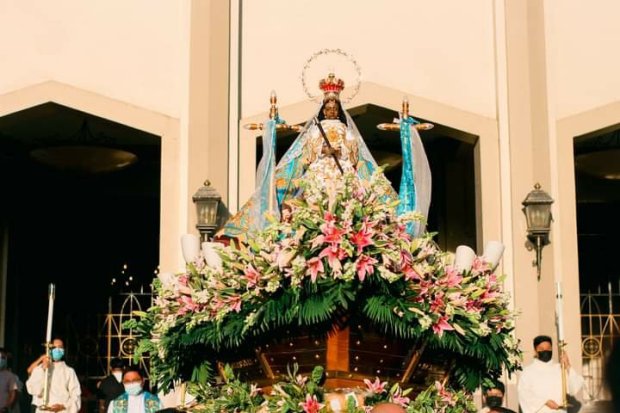
2021 is filled with much celebrations and milestones – through the manner of these celebrations were subdued to the ongoing pandemic that is still ravaging the world – namely the 500 Years of the Catholic faith in the islands and it’s subsequent Battle of Mactan, the 395th anniversary of the arrival of the image of Nuestra Señora de la Pz y Buen Viaje de Antipolo in our country and the 160th birthday of our National Hero Dr. Jose Rizal, whose fame and enigma still holds much influence up to this day. These three celebrations highlights the cultural importance and impact that affect and changed our lives that gave us a good foundation for our nationhood: the strong Catholic faith, the devotion to the Virgin of Antipolo and the heroism of Dr. Jose Rizal.
For this blogpost, the blogger will be sharing the English translation of Dr. Jose Rizal’s “Junto al Pasig”, one of his little known literary piece that he wrote for the Jesuits for the Feast of the Immaculate Concecption where the Virgin of Antipolo and it’s Fiesta procession was immortalized while it gives an interesting plot on the Filipino’s Catholic faith and it’s long forgotten paganism. We will also look on his devotion to the Virgin of Antipolo and how it influenced his life and writings (including this play) until his death in 1896.
Rizal and the Virgin of Antipolo in his younger years
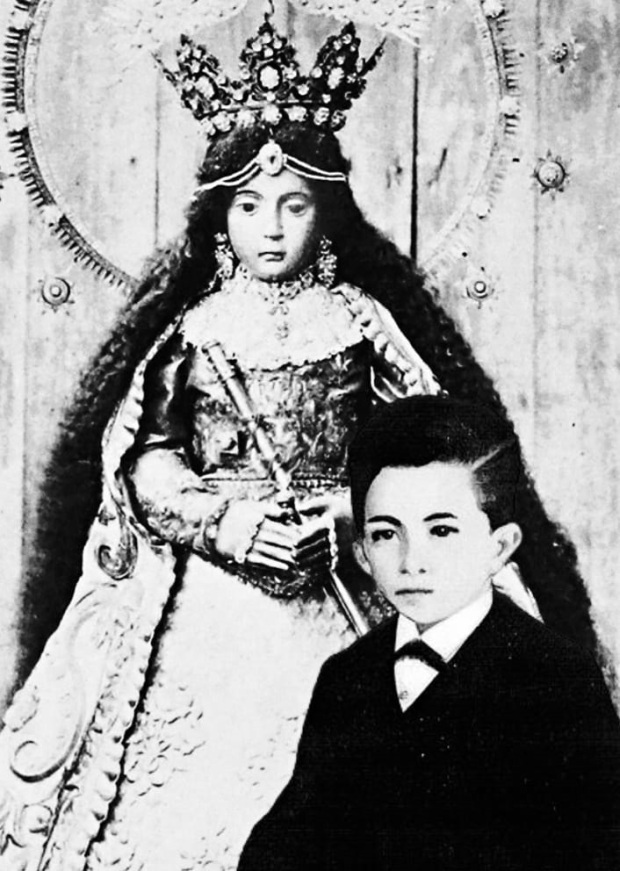
Dr Jose Rizal is arguably one of the most well known devotee of the Virgin of Antipolo and he frequently references her in many of his works. But how it all began?
In his memoirs of his younger years, he narrates that his mother Doña Teodora Alonzo, a member of the Venerable Third Order of St. Francis of Assisi, had a difficult preganancy that she almost died of childbirth because of his big head have she not made a vow to the Virgin of Antipolo to make a pilgrimage to her shrine if she will have a safe delivery of Jose.
He was able to fulfill this promise on June 6, 1868, accompanied by his father, Don Francisco Mercado Rizal since Doña Teodora was advancing with age and just gave birth to his sister which limits her movements in the years to come. He also kept a souvenir print of the Virgin of Antipolo that he brings along to his travels.
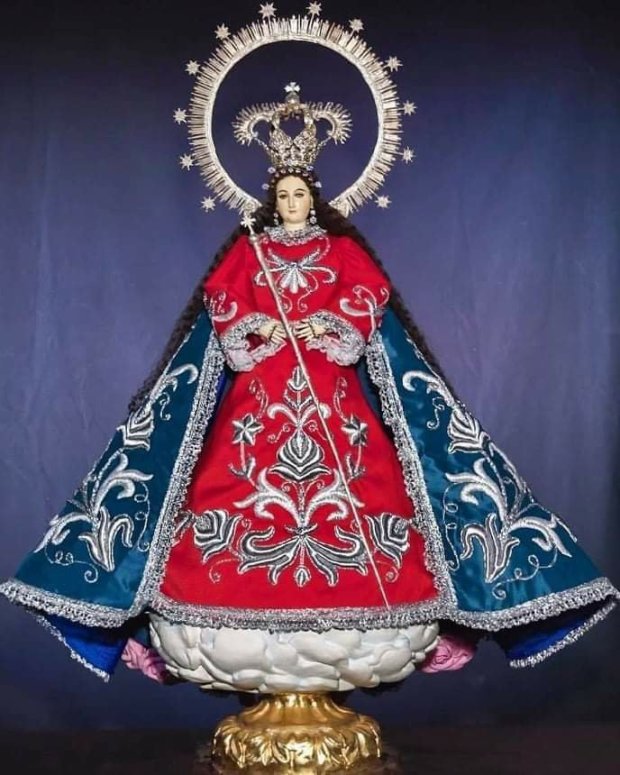
From here we see that it was from this vow from his parents that helped cultivate his devotion to the Brown Virgin that would carry on in his entire life. When he was sent to Biñan, Laguna (the birthplace of his father) for early studies under the guidance of Justiniano Aquino Cruz, he frequently visit a chapel dedicated to Our Lady of Peace and Good Voyage that was believed to be established in 1867 which would later become a parish in 1967.
Writing Junto al Pasig
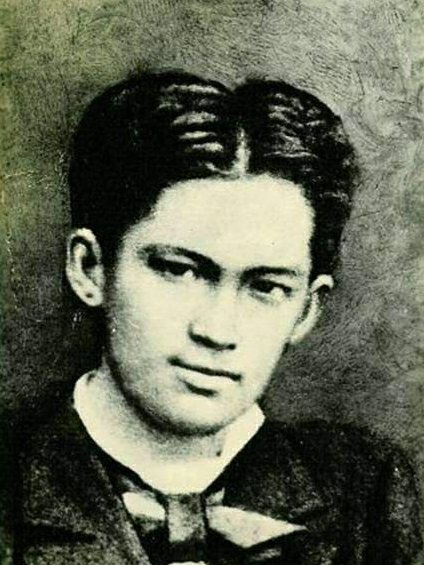
In his student life in Manila, the role of the Virgin of Antipolo is still prominent in his life where he notes that brings print of the image of the Virgin when he left home for school and later in his travels during his adulthood. In 1880, the Virgin of Antipolo would become Rizal’s muse when he wrote the zarzuela (one act play) entitled “Junto al Pasig” (Along the Pasig) while he was taking both his pre medicine and medicine proper courses at the University of Santo Tomas (a rare privilege for a student like him which dispels the long standing misinformation that he suffered mistreatment at the University).
Although he was a student of UST at that time, the Jesuits of Ateneo, whom he remained close with after completing his studies there, asked him to contribute to the festivities in honor of La Inmaculada Concepcion (the Patroness of Ateneo) as the president of the Academia de la Literatura Castellana in Ateneo Municipal de Manila and it is from this request that he wrote the said zarzuela. The one act play was perfomed by the members of the Academia on December 8, 1880 – Feast of the Immaculate Conception and the music for the choruses was written by a Spanish professor, Blas Echegoyen.
The following English translation that is presented in this blog is adapted from is taken from the translation of Leon Ma. Guerrero that was published in 1949 in the book “The Young RIzal”.
Along the Pasig
One Act Play by José Rizal
CHARACTERS:
Leonido
Candido
Pascual
Satan
Angel
Children’s Chorus
Demons’ Chorus
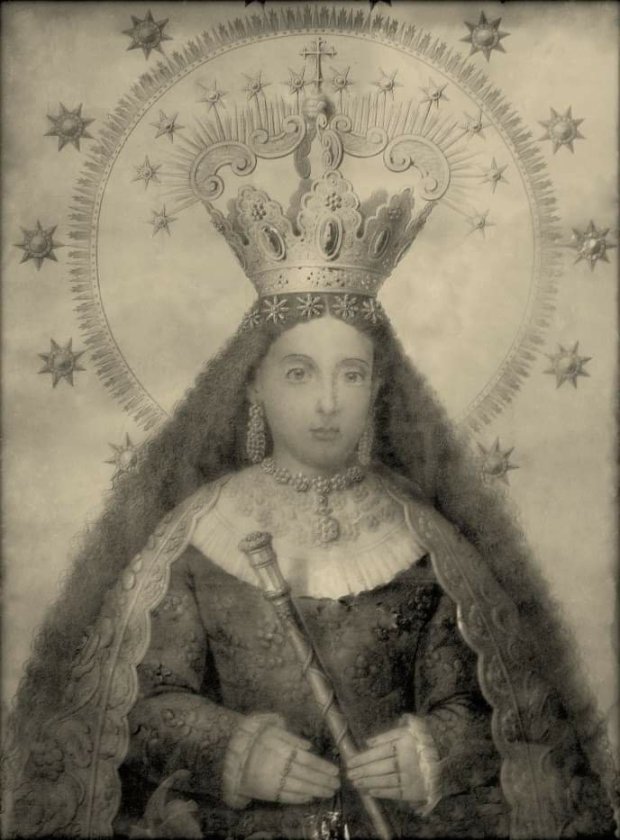
The action takes place along the Pasig River, in the town of the same name.The backdrop should show the river and the bank opposite to that on which are the actors.The church, houses, cane-fields, and a profusion of banners and other decorations common in the towns of this archipelago should be pictured.It is the hour of dawn, and consequently the lighting of the scene should be subdued.
FIRST SCENE
(Candido, Pascual, and other children.One of them carries flowers; the others have pennants and toys suitable for children.)
Chorus
Pretty Pasig, pretty river,
Wear your best bouquets,
Happy morning, dawning, give her
All our brightest rays.
Clear and cloudless skies above her,
Pink with dawn her cheek,
All who see her now must love her
All who beauty seek.
Here the river gives in beauty
Peace of heart and mind,
He the soul beset with duty
Happiness may find.
Candido: What a beautiful morning! The flowers look fresh at dawn! Listen to the bamboo along the river, and to that little bird singing! Everything is so pretty it makes me feel wonderful. Don’t you feel it too? Don’t you feel that everyone is happy because the Virgin is coming by today?
All: No doubt about it!
Pascual: The whole town is excited.The coming of the Virgin has made them so happy that they are dancing around with joy. All the streets are decorated and everyone, young and old, has gone out to watch Her pass buy.
First Boy: That’s true, Pascual. I believe it. The people cannot wait to hang up pennants and flags.
Second Boy: I am going to give the Virgin this basket of flowers. Let me see! (With contempt) That isn’t much. At home I have a cage with birds of different colors, you should hear them sing. That is what I shall give Her when She passes by.
Third Boy: Little Birds! How silly! (Boastfully) I’ve got firecrackers.
First Boy: Go on! That’s for scaring people.
Third Boy: Are you scared?
First Boy: I? No
Pascual: I have a flute at home. (All laugh)What is strange about that?I do have it, and I shall play it too.You know my father has taught me to play different tunes, pretty, very pretty. I shall play them; you shall see.
Second Boy: My flowers will be better.
Pascual: My flute.
First Boy: You are both crazy. My bird-cage is better.
Third Boy: No, my firecrackers are better.
First Boy: No, sir.
Third Boy: Yes, sir.
First Boy: Stupid!
Third Boy: That silly bird-cage is worthless.
First Boy: Your firecrackers are worse.
Candido: Come, friends, do not quarrel. Each gift is good, but let me ask you one thing.Listen to me, and let us do what I say. Let us decorate a banca with banners and pennants of different colors and let us paddle slowly along the river in it.You shall bring your flowers; and you, the bird-cage; and you, the firecrackers. This one can play his flute; and so we shall go along the river until we meet Our Lady. What do you think?
All: Good, very good.
Third Boy: Nothing better.
First Boy: Let us go look for the banca.
Candido: Hat is what I say too.(Ready to go)But wait.Where is Leonido?
Pascual: That is right.Where did he go?
Second Boy: Where could he have gone?
Third Boy: I do not know.
Candido Well, then, let us look for him first.Let us leave the banca for later; it does not matter.Right now we lack the most important thing, for we do not have our leader.
First Boy: Let us look for him.
Candido: Right now.Without him, nothing can be done.
Third Boy: We shall find him even if we have to drag the bottom of the river.
Chorus:
Let’s go, let’s go,
Let’s go without delay,
For Mary mild
Will bless this happy day!
SECOND SCENE
(Enter Satan, pale of visage, dressed in black and red.)
Satan: Can it be true? Is it possible that the people that once adored me are now to be saved? What unique power shelters and shields these ignorant sailors of the stormy sea of life, so that they manage to escape the traps I set for them? Who can have taken them out o the darkness where they were buried, and has lifted them to the light of day? Alas, to my misfortune, it was surely you, oh Woman, you whose virtue once sufficed to cast me down from my heavenly seat! Privileged creature, when shall I prevail against you? Damnation Hell itself, where sorrow, and cruel suffering, and horror dwell, cannot rival my eternal despair. Alas, sad fate, to be deprived of the sweet happiness of heaven! Why did my Conqueror refuse me one last boon: that in the terrible bitterness of my fall, I should find consolation in the arms of death?
Alas, I am a spirit, a sublime, and also a miserable and wretched being, condemned to suffer for eternity under the Hand which weighs upon me. When man on earth sighs and weeps because life is hard, he consoles himself amid his sufferings with the thought that life is also short.But an angel does not dare to hope that he shall die. Patiently I must endure my dark and inevitable destiny, for in my matchless war with heaven, fortune was against me. Still, though vanquished, I pursue my fatal course. He loves the good, I love evil. Excellent! Let Him do what He will, I shall wreck His plans. It is but just, for He is my mortal enemy; let our duel begin!I shall consider how, with cunning and with perfidy, I shall recover my unequalled empire. Earth, I envy you! And I shall recover you! I shall wait here in hiding for some unwary Christian. (Hides himself behind a tree) The race I hate so much shall fall again into my hands.
THIRD SCENE
(Enter Leonido)
Leonido: The bank is deserted.I do not hear any shouting. It is strange; already the day is bright, and I do not see anyone here. They should have arrived by now; they promised me they would come…. Can they have left already? . . . Maybe I have lost my way. But no, this is the path that leads to town…. Here is the river; there the church, my house, the banners…. Of course this is the playground Pascual told me about. He said we would wait here for the Immaculate Virgin to pass…. But how can I be sure that they have not just left? The best thing would be to go look for them. I shall go downstream . . . no, upstream…. I think the procession will not be long in coming
(He makes ready to leave when Satan enters, dressed as a “diwata”).
FOURTH SCENE
(Leonido and Satan)
Satan: Stop! Where are you going?
Leonido: Who are you?
Satan: Don’t you know me?
Leonido: I do not remember your face, nor do I recall ever having seen you. Let me pass.
Satan: Never. Look at me well.
Leonido: Tell me, please, who are you?
Satan: I am he who, with matchless power, gives laws to the hurricane, the sea, and the fire he who flashes in the lightning and roars in the torrent.I am he who in a fairer age ruled with grandeur and power, venerated and feared, the absolute god of the Filipinos.
Leonido: You lie! The god of my ancestors already sleeps in shameful oblivion. His obscene altars, where victims by the thousands were offered to the chant of ill-omened devotions, now lie shattered.We have words only of contempt for the forgotten rites of his broken power. You are no god; I am sure you lie, for only one true God exists, the God who made man and the whole world, and whom our finite mind adores.
Satan: Fool! Do you not fear the power of my anger? Impious child, do you not see that mine is the air you breathe, the sun, the flowers, and the billowy river? At my call, strong with the power of creation, these islands rose from the waters, islands lighted by the dawn and which once were fair. As long as faithful to my holy cult, the people lifted up their prayers before my altars, I saved them a thousand times from death, hunger, fear. The fields overflowed with fragrant greenery; the golden grain sprouted without labor from the hallowed earth, then undefiled. The spotted goat, the fleet deer, and the fat cattle, wandered over the peaceful meadow. The industrious bee dutifully filled her comb with delicious honey as a gift to man. The crow, secluded in its nest, did not cry sad omens of terrible calamities. This rich land then enjoyed such a happy age that in its delights it rivaled heaven. But now, disconsolate and afflicted, it groans under the rule of alien people, and slowly dies at the impious hands of Spain. Withal, I shall liberate it, if it bends the knee to my cult, which shines with splendor still. So powerful am I that, at this very moment, I shall give you everything you may desire, if only you adore me. But woe unto you if you are blind and distrustful, for I shall open at your feet the deep abyss.
Leonido: If you are so powerful, if the destiny of mortals is in your hands, why have the Christians proved to be your undoing? And if, as you say, the wild sea is your humble hireling and obeys your voice of command, why were not the frail Spanish caravels, which now deride you, swamped and buried underneath the waves? Why did your stars guide them in the gloomy night and the wind fill their sails? Why did you not hurl your thunderbolts upon them? Does that prove perhaps that you are omnipotent? But greatest of your misfortunes is the Name of Mary, a name which consoles the afflicted human even as it rebukes your arrogance, the Name which erased the last tracts of your cult.
Satan: The last traces of my cult! Wretch, do you not know that only a people prostrate in adoration before me, is safe? Ah, the future shall bring the disasters I reserve for you race, which follows this profane religion: tragic calamities, pestilence, wars, and cruel invasions by various nations in coming ages not far distant. Your people will water with their blood and tears the thirsty sands of their native land. The bird, wounded by burning metal, no longer shall raise its song in the pleasant meadow, nor in that time of affliction shall your ancient forests, your rivers, your valleys and your springs be respected by the hateful men who shall come to destroy your peace and prosperity, while I, in my vengeance shall unloose the untamed winds which, with ferocious rage, shall make the elements run riot to worsen with horrible travail the sad fate of the frail canoe sinking in the waters.In my hatred I shall raze the green fields of their best grain, and from the tall summit of the proud mountain I shall hurl a burning river of lava which, wrapped in smoke and devouring flame, shall lay desolate the towns like a furious torrent that, overflowing, tears out unnumbered trees. Benumbed at my passionate command, the earth shall tremble with grievous shocks, imperiling with each movement the rich land and all life upon it. Alas, alas, how great that desolation! What useless groaning, how much weeping, shall I hear then, but in my heart shall be no pity for this people, and I shall look on with insolent merriment, laughing in my mortal hatred!
Leonido: You lie! You can do nothing. I adjure you, in the name of the Lord whom my soul adores, to tell me who you are. Angel or impure spirit, who wishes to seduce me, take off that mask which gives your primitive figure an infernal aspect.
Satan: Very well, then, behold! (In devil’s dress) Observe and note that I am Satan, the angel who in an age remote sat splendidly upon a throne, his brow magnificent with light. I am he who, with ferocious rancor, gave battle to Heaven’s Tyrant. Then, vanquished in hopeless defeat, I dragged your ancestors behind me to their souls’ death. But if the Christian’s lofty faith has prevailed against my fury, I shall avenge the mortal injury on you. I am the stronger, and if you do not wish to die, fall at my feet.
Leonido: Never!
Satan: Behold my power and my glory! The mighty spirits that rule the universe, obey my voice. Follow my heroic flag! Here me: if humbly you abjure your new devotion, and repentance take yourself with fervent faith to my altars, I shall make you happy, and fill you with delight. You shall have whatever you desire: the river which runs at your feet, carrying diamonds and pearls, the air you breathe with its myriad creatures, these plants, these flowers, those houses, groves – all shall be yours if now you cast aside your new-found faith, if you condemn the hateful name of Her whose feast it is today. But, woe unto you if in your obstinacy you choose to disobey me, for at your feet this very moment the fearsome earth shall open, burying you in its profundity, as a drop of water is buried in the sand in a time of drought!
Leonido: It is in vain that you try to strike cowardly fear into me with your tongue. In vain, in vain, do you pretend that I should bow and worship. Never shall the devil frighten the Christian child. Before the Son of Mary, eternal Hell itself shall tremble. Lying spirit, go! Flee and return to your place of darkness, to the dwellings of despair and eternal shame.
Satan: Very well. Since you have wished it so, then you must die. You shall be the last victim to burn upon my altars; you shall play for your people; in you I shall avenge my wrongs. Spirits, loyal companions, who find evil sweet, who feed with cruel bitterness on the hatred that your souls contain, come to me joyfully, the war begins.
FIFTH SCENE
(Enter demons, tumultuously)
Demons’ Chorus:
Who calls in accents fell?
Who would our might employ?
Long live the realms of Hell
And all its evil joy!
Whoe’er defies our spell,
A thousand deaths destroy!
Satan: You have come at a happy moment, hear me attentively. My voice has called you because today sweet revenge shall crown our fondest hopes.
Demons Chorus:
We devils love our king,
We go where’er he goes,
When he commands, we bring
Destruction to his foes!
Satan: Unhappy boy, repent your offenses; return wholehearted to my cult; come and bless my spotless image, and upon you fortune shall smile.
Leonido: Vile traitor, I detest you. Only to God do I render love. While I live, I shall be faithful; for Him I wish to die.
[NOTE: At this point it is assumed that Leonido stages his death ending in sleep]
Demons:
Long live, long live our Chief,
For him our every breath –
Who grudges him belief
Will suffer death, death, death!
SIXTH SCENE
(The same and an Angel)
Angel: Back, spirits damned by the anger of heaven! Speed your wings to the mansion of sorrow! Flee if you fear the deadly flash of the thunderbolt! Flee, perverse leader, traitorous archangel! (Devils flee)
And you, faithful child, awaken. (Leonido awakens) Come to me. I am the messenger of heaven, who has freed you from the perfidious Satan. Already the virgin of Antipolo sails the waters of the river. Salute her with pious hymn, for you shall always be Her child. Mercifully she saved you from the clutches of hell. Be Her most loving son, for She brings happiness. Already your companions arrive; they have looked for you eagerly. Farewell, then; I must return to heaven. Farewell, Leonido farewell! (Disappears.)
Leonido: Farewell, beautiful spirit, my deliverer, guardian of the sleeping child!
LAST SCENE
(Leonido and the children.The Virgin can be seen passing by along the river, shortly before the final chorus)
Candido: Leonido! We were looking for you!Look, there is the Virgin Mary! Listen to those thousands of voices singing to Her in harmony!
Leonido: Yes, friend, I can hear them; I too see Her coming. Oh, what secret happiness I feel in my heart! Let us sing a song together on this happy day; let us salute the Virgin! What do you say, friends?
All: Yes, yes.
(The Virgin appears, illumined with light.)
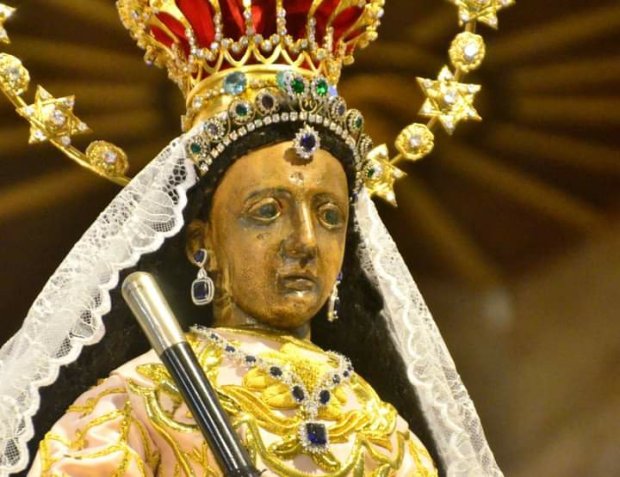
Final Chorus:
¡Salve Rosa pura
Reina de la mar!
¡Salve! Blanca Estrella,
Fiel Iris de Paz…
Antipolo,
Por tí sólo
Fama y renombre tendrá.
De los males,
Los mortales
Tu imágen nos librará;
Tu cariño,
Al fiel niño
Le guarda siempre del mal;
Noche y día,
Tu le guías
En la senda terrenal.
[English translation:
Hail to Thee, Queen of the sea,
Rose without stain,
Star without wane,
Rainbow of peace, hail to Thee!
Hail, Antipolo’s renown,
Source of its fame,
Image whose Name
Saves whom the devil would drown.
In thee we can ever confide,
Mother of all,
Whatever befall,
Night unto day, our Guide!]
FIN
A Retrospective Analysis
The play was set on the festivities in honor of Nuestra Señora de la Paz y Buen Viaje of Antipolo. During Rizal’s time, the townsfolk were used to carry the image of the Virgin of Antipolo during a solemn procession through the Pasig River until it reached her shrine in Antipolo. Interestingly, in 1904, Wenceslao Retana, a critic turned admirer of Jose Rizal, notes that the students from Ateneo sung the last chorus from Rizal’s play during the procession which gives an impression that it became part of the hymns dedicated tot he Virgin.
In the play, Jose Rizal framed the play as an inquiry to with what Christians believe. Through Leonido, the main character, a teenager, Rizal portrayed another perspective of Satan and the Virgin Mary. He centers on thoughts such as Who is the real redeemer of mankind? Who should really be adored? Who should one believe? Does one have to believe? The play’s theme revolves on Christianity, Innocence against Evil, and Paganism.
Interestingly, in an analysis by Rafael Palma, he opined that Rizal’s means of conveying the disguise of Satan (as a “diwata”) portrays Rizal’s nationalism. This is in line with the selection of a Filipino setting, cast, and even the selection of a native representation of the Virgin Mother in the Philippines (Our Lady of Peace and Good Voyage), the concept of the “diwata” likewise depicts an equally native means of paganism.
Postscript
Years after the play was staged, he would later write a sonnet dedicated to the Blessed Virgin Mary entitled “A la Virgen Maria” which he writes:
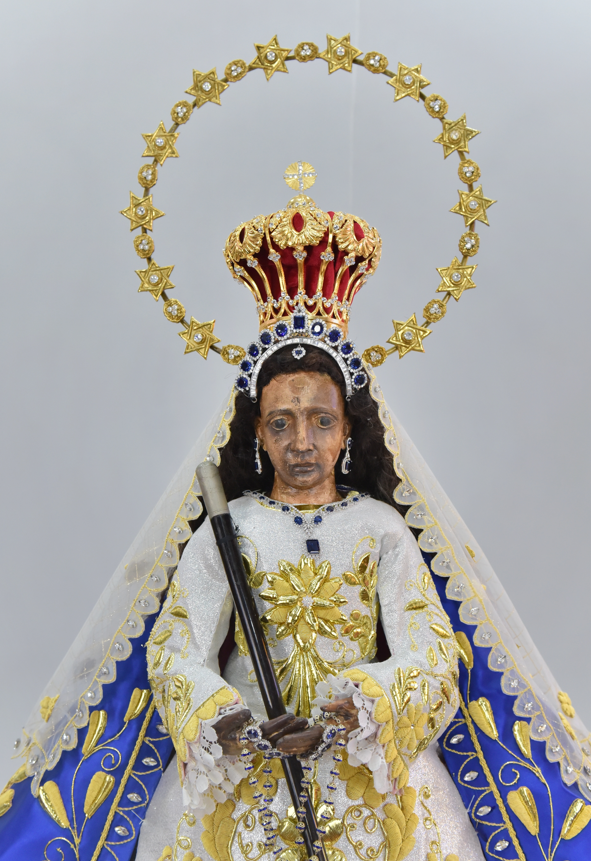
A la Virgen Maria
¡María, dulce paz, cardo Consuelo
De afligo mortal! Eres la fuente
Do mana de Socorro la corriente,
Que sin cesar fecunda nuestro suelo.
Desde tu solio, desde el alto cielo,
¡Oye piadosa mi clamor doliente!
Y cobije tu manto refulgente
Mi voz que sube con velóz, vuelo.
Eres mi Madre, plácida María;
Tú mi vida serás, mi fortaleza:
Tú en este fiero mar serás mi guía.
Si el vicio me persigue con fiereza,
Si la muerte me acosa en la agonía,
¡Socórreme y dispa mi tristeza!
[English Translation: To Virgin Mary
Mary, sweet peace, solace dear
Of pained mortal ! You’re the fount
Whence emanates the stream of succor,
That without cease our soil fructifies.
From thy throne, from heaven high,
Kindly hear my sorrowful cry!
And may thy shining veil protect
My voice that rises with rapid flight.
Thou art my Mother, Mary, pure;
Thou’ll be the fortress of my life;
Thou’ll be my guide on this angry sea.
If ferociously vice pursues me,
If in my pains death harasses me,
Help me, and drive away my woes!]
His later works
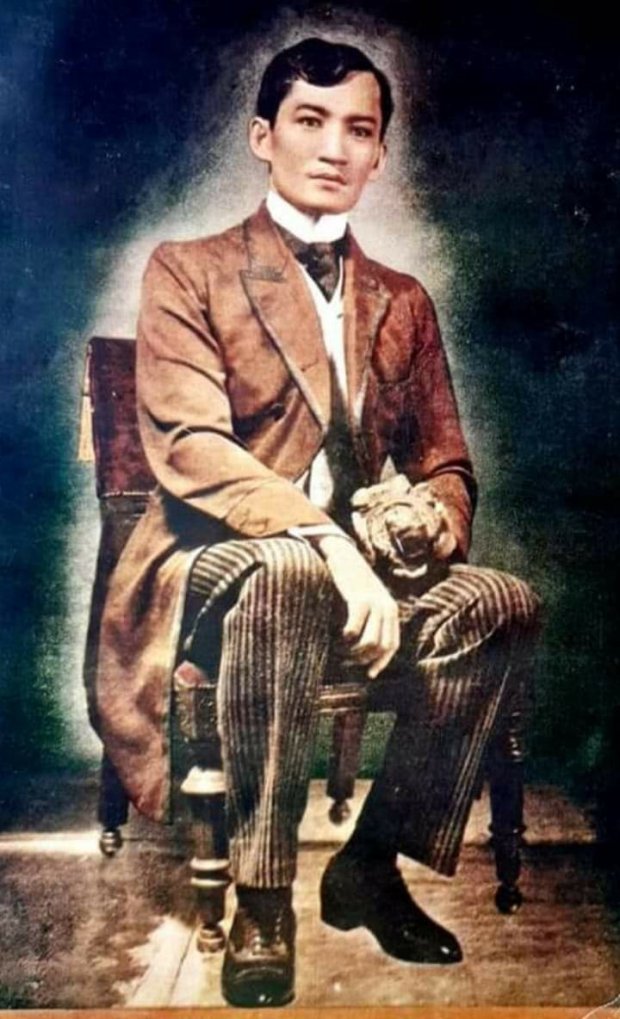
When he left for Europe to pursue further studies, Rizal started to drift away from the Catholic faith due to his association with free thinkers, atheists and freemasons. He, along with other patriots from Marcelo H. del Pilar, Graciano Lopez Jaena, the brothers Juan and Antonio Luna, Jose Ma. Panganiban among others began to campaign for reforms for the Philippines that led to the Propaganda movement which was highlighted with the publication of “La Solidaridad”. It was during these times that he wrote his two famous and controversial novels “Noli me Tangere” (Touch me not) and “El Filibusterismo” that helped shaped the nationalist movement in the Philippines which it reached it’s peak with the spark of the Philippine Revolution in 1896 that led to his death in Bagumbayan by public execution.
In the two novels, we would find that among the venerated images mentioned in them, the Virgin of Antipolo was frequently mentioned on numerous occasions. In Noli, apart from being the Venerated Virgin of the town of San Diego, he associated the Virgin to the character of Don Santiago de los Santos, or Capitan Tiago, the foster father of Maria Clara de los Santos (whose biological father was Padre Damaso de Vardolagas, a renegade Franciscan Friar) where he would perform excessive pious acts to the Virgin yet he treats his devotion as a hall pass to his vices and questionable acts.
In El Filibusterismo, the Virgin was barely mentioned in the entire novel, except on the one scene where a lady wanted to buy an expensive ring from Simoun (an alter ego that Crsisostomo Ibarra embodied after the tragic events that befell on him in “Noli”) yet she was taken aback after learning it’s high price tag. Though he did not wrote any criticisms about the Blessed Virgin Mary, it was the misguided pious acts towards her that he questioned in his novels to show the hypocrisy of the scoirty on treating the divine as a getaway from their wrongdoings and much excess. In reading these two fictional works of Rizal, most would often see that these were anti-friar, yet most of the average readers would often overlook Rizal’s criticism on his fellow Filipinos who succumbed to vices, greed, corrupt morals, misguided ambition and misdirected pious belief that contradicts to what the Church actual teachings which can lead to a social cancer that if not treated, it can lead to a rotting society.
The legacy of Dr. Jose Rizal is unquestionable beyond doubt because of the influence of his life and writings that helped shaped our nation. If we could only read his works smartly, and considering the circumstances of his time, we can then truly understand his message and lessons that help us in our present as we continue our journey on building our nation – with the guidance of the Blessed Virgin Mary, the Immaculate Conception, the Patroness of our land.
References:
Balerite, Gaspar, Jose P. Rizal: Human and Catholic, Paulines Publishing House, Pasay City, 2017.
Dagohoy, Herminio, OP, The Saga of La Naval, Triumph of the People’s Faith, Dominican Province of the Philippines, Quezon Avenue, Quezon City, 2007.
Delos Reyes, Michael P., Inmaculada Peregrina, City, Claret Communications Foundation Inc., 2020.
Delos Reyes, Michael P., Morena Graciosa: The devotion to the Virgin of Antipolo through the centuries, Diliman, Quezon City, Claret Communications Foundation Inc., 2016.
Guerrero, Leon Ma., The Young Rizal, Bardavon Book Company, Manila, 949 and 1950).
Villaroel, Fidel, Jose Rizal and the University of Santo Tomas, UST Press, University of Santo Tomas, Manila, 1984.
Photos:
Birhen ng Antipolo – National Shrine of Our Lady of Peaace and Good Voyage Facebook page
Madrid, G Antonio of Nuestra Señora de la Paz y Buen Viaje Parish, Biñan, Laguna
Malabanan, James Benedict
Naval, Jason of My Religious Journey
+AM+DG+

2 Comments